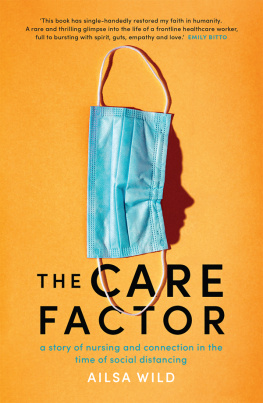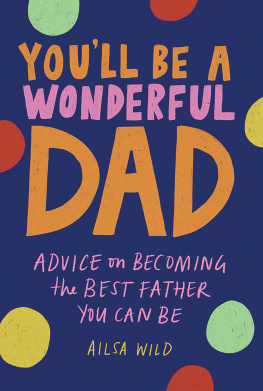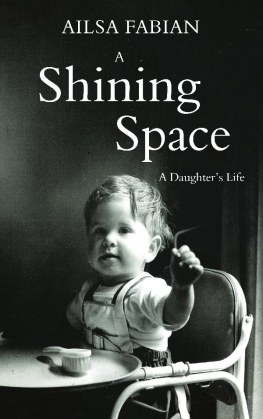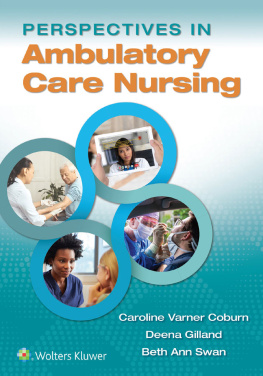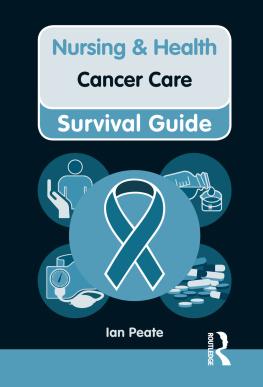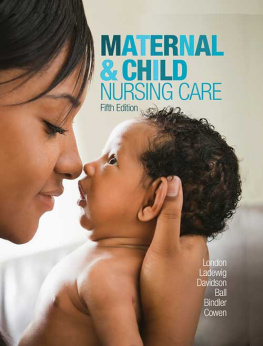Ailsa Wild - The Care Factor: A story of nursing and connection in the time of social distancing
Here you can read online Ailsa Wild - The Care Factor: A story of nursing and connection in the time of social distancing full text of the book (entire story) in english for free. Download pdf and epub, get meaning, cover and reviews about this ebook. year: 2021, publisher: Hardie Grant Publishing, genre: Detective and thriller. Description of the work, (preface) as well as reviews are available. Best literature library LitArk.com created for fans of good reading and offers a wide selection of genres:
Romance novel
Science fiction
Adventure
Detective
Science
History
Home and family
Prose
Art
Politics
Computer
Non-fiction
Religion
Business
Children
Humor
Choose a favorite category and find really read worthwhile books. Enjoy immersion in the world of imagination, feel the emotions of the characters or learn something new for yourself, make an fascinating discovery.
- Book:The Care Factor: A story of nursing and connection in the time of social distancing
- Author:
- Publisher:Hardie Grant Publishing
- Genre:
- Year:2021
- Rating:4 / 5
- Favourites:Add to favourites
- Your mark:
- 80
- 1
- 2
- 3
- 4
- 5
The Care Factor: A story of nursing and connection in the time of social distancing: summary, description and annotation
We offer to read an annotation, description, summary or preface (depends on what the author of the book "The Care Factor: A story of nursing and connection in the time of social distancing" wrote himself). If you haven't found the necessary information about the book — write in the comments, we will try to find it.
Ailsa Wild: author's other books
Who wrote The Care Factor: A story of nursing and connection in the time of social distancing? Find out the surname, the name of the author of the book and a list of all author's works by series.
The Care Factor: A story of nursing and connection in the time of social distancing — read online for free the complete book (whole text) full work
Below is the text of the book, divided by pages. System saving the place of the last page read, allows you to conveniently read the book "The Care Factor: A story of nursing and connection in the time of social distancing" online for free, without having to search again every time where you left off. Put a bookmark, and you can go to the page where you finished reading at any time.
Font size:
Interval:
Bookmark:

This book was written on the lands of the Wurundjeri people, whose sovereignty was never ceded and whose struggle for justice continues daily. We would like to pay our respects to their Elders, past, present and emerging; to the Indigenous healers who have cared for this country and its people since time immemorial; and to all Aboriginal people and Torres Strait Islanders on whose lands we live, work and care.
To the carers whose work, hours and expertise so often goes unseen and unacknowledged.
This book began as immediate memories told to Ailsa by Sim in recorded conversations in the days following the events they depict. Some people in this story have had their identities obscured by changing their gender, diagnosis, occupation or other identifying features. Other people gave consent to be named and appear as themselves. Some are actually two people magically squished into one for the sake of clarity and simplicity. The whole book is told from the perspective of our friendship which is just one window of millions into the events of the pandemic in Melbourne. Everything in this story happened.
This book touches on stories of trauma, sexual violence, domestic abuse and Covid deaths. If these topics are difficult for you, go gently.
Contents
THERE ARE GOING to be so many half-naked nurses on front porches! Sim laughs. How else are we supposed to take off our infected clothes after we leave the hospital but before we step into our houses?
Simone is going through the nitty-gritty of how her days look now: the pathway from her front door to her laundry; how shell keep her girlfriend, Emily, and their housemates safe from infection; how shes going to stay hydrated throughout her shifts.
Theyre getting us to wear the masks all the time so we dont waste them. These masks arent designed to be simply pushed aside and then returned to position. Once theyve touched other parts of the face, theyre considered contaminated and need to be disposed of. At one point I left the room, did my hand hygiene, took my gown off, cleaned my hands again, grabbed my water bottle and undid the lid. It wasnt until Id almost pushed it into the mask that I remembered I couldnt drink. Not for another two hours.
I breathe out quietly on the other end of the phone, aware that my friend is at the very beginning of this journey. Thinking of the hard work that lies ahead for her, where a few hours without water will probably be the least of it.
Sim has put up her hand to retrain for ICU in response to the global pandemic. In other parts of the world hospital corridors are full of patients who dont fit in the wards. Theyre sending the elderly home without treatment, theyre talking about turning ice-skating rinks into temporary morgues. My social media feed shows cities applauding their medical staff from a million balconies. There are memes about how the disaster movies got it wrong: turns out we dont need to know how to shoot aliens or barricade our homes from zombies.
The skill we need is how to care for a sick human body. My friend has this skill.
I dont. My skill is to listen.
Sim is the kind of person who really likes talking. She goes into intimate, gory detail about her work. She explores her emotional reactions and checks my thinking about her relationships. She treats each new patient, each colleague, with a deep, humane respect. She texts me her griefs and terrors in the middle of the night. Shes constantly analysing her work through a queer feminist lens, and Im admiring of, and sometimes utterly exhausted by, her drive towards integrity.
I want to write her story.
Do you trust me? I ask. Im not going to ask you to read anything now. Not until its all over. But later? I wont publish anything youre not happy with.
Yes, yes! she says. And then: This feels like such a privilege. Like, why would you do this for me? There are people whose work is so much more important than mine.
Its true, there are people doing bigger-picture organising work, or whose faces might be even closer to the trauma of this thing. But I disagree that their work is more important.
Also But I dont have this relationship with them, I say.
Her voice changes. Grows stronger. I know, she says.
ITS 20 MARCH and Im in a doom spiral, fear-scrolling and heartbroken. There are twenty-eight new cases of Covid-19 in Victoria. Yesterday 2700 passengers disembarked from the Ruby Princess cruise ship into Sydney. My sister just called from London to ask me to keep my three-year-old home from childcare. Its time.
Ive been working from home for years, setting up and packing up my laptop from the kitchen table each day. I think of this house as mine alone. Those hours when Jono is at work and Jacks at childcare, the stretching peace of tea and silence and room for my brain to work they are what keep me sane.
Im about to give them up.
Im supposed to be writing a childrens book but I cant focus. Im afraid.
Instead, I call my friend in Sydney whose grandmother is dying in aged care. Limits on visitors keep shrinking. Shes from a big Greek family and everything feels wrong about her Yiayia being alone for a second. There should be cousins and great-grandchildren and love all around her for these final days. My friend manages to get permission for her children to come in for a ten-minute visit to say goodbye. With her own full-time work, the domestic load, and the children in her face, she sounds like she doesnt have time to grieve.
I call my single friend who is just back from an overseas work trip. Shes in quarantine at home alone facing lockdown as soon as her quarantine time ends. Shes been sharing articles about skin hunger and loneliness. I bite back my envy of her space, my longing to be alone. I listen to her sadness. And within minutes she has turned the conversation around to ask me how Im coping.
I call my friend who is helping to care for her bedridden father. He has a slow, debilitating terminal illness. Someone needs to wake with him several times a night because his bladder is shot. My friend is living a few nights a week at her parents house, trying to share the load, dressing in cobbled-together homemade PPE when she does the shopping.
I call my friend whos living on Centrelink with two kids and training to be a nurse. I check that shes got the tech she needs for remote learning.
I call my friend whose work as a touring theatre performer stopped overnight to find out how shes planning to manage financially.
I call my friend whos a high school teacher. He is spending the entire school holidays planning how to deliver distance learning.
I feel like they are all superheroes. I feel like I am part of a great network of carers who are holding up the world and I hope my phone calls lighten the burden. I realise that the phrase love makes the world go around isnt actually about the nice feeling I have in my chest sometimes.
Its talking about the hard, endless, soft, sleepless, exhausting labour of caring for our people.
That labour just got a whole lot harder.
I call Simone.
I make my first recorded call to talk about how shes feeling as the lockdowns roll in. Wuhan, Seoul, California, New Zealand and now us. Ive been listening to ICU nurses in New York talking about their days. The danger. The deaths. The lack of PPE. I want to know exactly whats happening in the hospitals here.
I ask her how she came to decide to retrain for ICU.
I guess I felt: Im up for this. Ive got ICU experience. Im fit and healthy and Ive got good support. So Im going to give it a go. For me, there wasnt a question. Sure, theres a part of me that would love to just bury my head in the sand but
Font size:
Interval:
Bookmark:
Similar books «The Care Factor: A story of nursing and connection in the time of social distancing»
Look at similar books to The Care Factor: A story of nursing and connection in the time of social distancing. We have selected literature similar in name and meaning in the hope of providing readers with more options to find new, interesting, not yet read works.
Discussion, reviews of the book The Care Factor: A story of nursing and connection in the time of social distancing and just readers' own opinions. Leave your comments, write what you think about the work, its meaning or the main characters. Specify what exactly you liked and what you didn't like, and why you think so.

